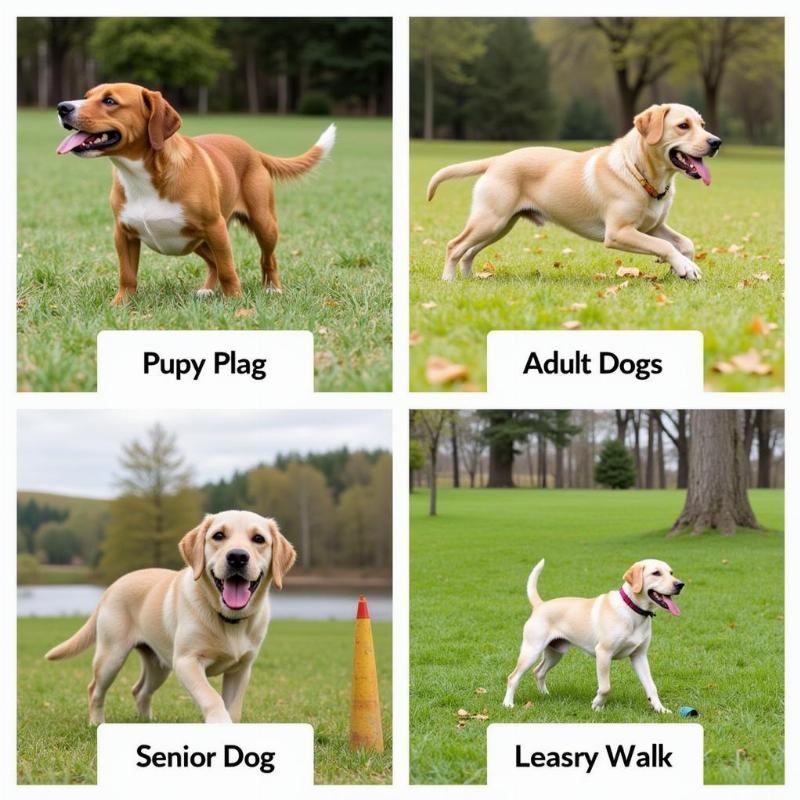The phrase “in dog years I’m gay” has recently emerged online, sparking curiosity and confusion. While seemingly nonsensical, it reflects a playful attempt to equate a dog’s accelerated aging process to human experiences and milestones. This article aims to clarify the concept of “dog years,” explore the complexities of canine aging, and dispel any misconceptions associated with the phrase. We’ll also delve into the importance of understanding your dog’s age to provide appropriate care and strengthen your bond.
Decoding “Dog Years”: Fact vs. Fiction
The common belief that one human year equals seven dog years is a significant oversimplification. Canine aging is far more nuanced, varying based on breed, size, and individual health factors. Smaller dogs tend to live longer than larger breeds, and their aging trajectory differs. Puppies mature rapidly in their first two years, reaching sexual maturity and a size comparable to a human teenager. Subsequently, the aging process slows down, with each year not equating to a fixed number of human years.
Why Understanding Your Dog’s Real Age Matters
Accurately assessing your dog’s age is crucial for providing optimal care throughout their life stages. Knowing their approximate human-equivalent age allows you to tailor their nutrition, exercise, and veterinary check-ups to meet their specific needs. For example, a senior dog may require joint supplements and a less strenuous exercise routine compared to a young, energetic puppy.
The Importance of Regular Veterinary Care
Regular veterinary visits are essential for monitoring your dog’s health and detecting any potential issues early. As dogs age, they become more susceptible to certain conditions like arthritis, dental problems, and cognitive decline. Preventative care, including vaccinations and parasite prevention, is crucial throughout their life.
Building a Strong Bond Through Age-Appropriate Activities
Understanding your dog’s age allows you to engage in activities that suit their physical and mental capabilities. Puppies need plenty of socialization and playtime, while adult dogs thrive on routine and consistent training. Senior dogs may enjoy gentler activities like short walks and cuddling.
 Dog Activities by Age
Dog Activities by Age
Dispelling the Myth: “In Dog Years I’m Gay” and its Misinterpretation
The phrase “in dog years I’m gay” has no scientific basis and seems to have emerged as online slang. It likely plays on the perceived accelerated timeline of a dog’s life to humorously express a personal journey or milestone. It’s essential to separate this internet phrase from the factual understanding of canine aging and avoid misinterpretations.
Conclusion
Understanding your dog’s age in human-equivalent terms is crucial for providing them with the best possible care and strengthening your bond. While phrases like “in dog years I’m gay” might be trending online, it’s important to rely on scientific understanding and veterinary guidance for accurate information about your dog’s age and health. By understanding their life stage, you can provide them with a fulfilling life filled with love, proper care, and age-appropriate activities.
FAQ
- How do I calculate my dog’s age in human years? While the “seven-year rule” is inaccurate, there are more precise charts and calculators available online and through your veterinarian that take into account breed and size.
- What are the key differences in care for puppies, adult dogs, and senior dogs? Puppies require more frequent feedings, extensive socialization, and basic training. Adult dogs benefit from a balanced diet, regular exercise, and ongoing training. Senior dogs may need specialized diets, gentler exercise, and more frequent veterinary check-ups.
- How often should I take my dog to the vet? Annual check-ups are recommended for most dogs, while senior dogs may benefit from bi-annual visits.
- What are some signs of aging in dogs? Common signs include decreased activity, stiffness, changes in sleeping patterns, weight gain or loss, and cognitive changes.
- How can I help my senior dog stay comfortable? Providing orthopedic beds, maintaining a comfortable home environment, and offering joint supplements can help improve their comfort and quality of life.
- Is the phrase “in dog years I’m gay” related to actual canine aging? No, the phrase is internet slang and unrelated to canine aging or health.
- Where can I find reliable information about dog care? Your veterinarian, reputable animal welfare organizations, and websites like Beautdogs.us offer credible information about dog care.
Beautdogs.us: Your Trusted Source for All Things Dog
Beautdogs.us is your one-stop destination for expert advice on dog breeds, care, and products. We provide comprehensive, reliable information for both new and experienced dog owners, empowering you to provide the best possible care for your furry friend. From breed-specific guides to health tips and product recommendations, Beautdogs.us is committed to helping you navigate the joys and responsibilities of dog ownership. Contact us at [email protected] or +1 501-555-7529 for personalized advice and discover the wealth of resources available at Beautdogs.us.